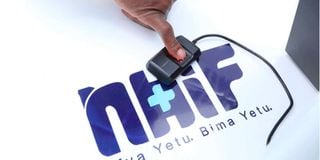Employers to top up staff NHIF payments

An NHIF member undergoes biometric registration at the Wamagana Education hall in Nyeri County on June 2, 2021.
The National Assembly has ignored protests by employers and adopted a proposal that requires them to top up contributions made by employees to the National Hospital Insurance Fund (NHIF).
The employers, through the Federation of Kenya Employers (FKE), have been opposed to the proposal contained in the NHIF (Amendment) Bill 2021, which the House considered yesterday.
The employers had warned against being compelled to match the contributions arguing that this would affect their wage bills and undermine the capacity of enterprises to create new jobs.
But MPs shrugged off the concerns and unanimously adopted the proposal, setting the stage for the increased contribution to the fund that, if implemented, will see the NHIF raise an additional Sh25 billion.
The Bill establishes the National Health Scheme whose membership will be compulsory for every adult Kenyan, contributing Sh500 every month or Sh6,000 annually. Any person who attains the age of 18 years and is not a beneficiary will be forced to register as a member of the fund.
While the Bill had mandated employers to contribute for their staff, Leader of Majority Amos Kimunya successfully pushed an amendment that binds employers to match contributions with what their employees are liable to contribute to the fund.
NHIF Board
In the same amendment, for both the national and county governments, the top up will be at such a rate as may be determined by the NHIF board and the Ministry of Health. Mr Kimunya’s amendment also introduces two categories of those whose contributions are not from salaried employment – unemployed persons who have no family and unemployed with family.
“The idea is to equalise the contributions so that we allow as many people as possible to contribute commensurate with their burden,” Mr Kimunya said.
Attempts by South Mugirango MP Sylvester Osoro to oppose the amendment were rejected. Mr Osoro had questioned the use of the word top-up and had insisted that the employers be compelled to pay a shilling for each shilling paid by their employees.
Both the national government and county governments will be contributors on behalf of indigent and vulnerable persons. The national government’s contribution shall be a special one, determined by the Board in consultation with the Minister.
Vulnerable persons
Funyula MP Oundo Mudenyo’s amendment, which had proposed that a committee be set up at the constituency level to help identify indigent and vulnerable persons, was rejected by the House with MPs arguing that the proposal would create another level of bureaucracy that would undermine the roll-out of the programme.
Actors in the insurance industry say the requirement for employers to match employee contribution will impact on the cost of labour and have warned that employers who have supplemented their employees’ NHIF insurance cover with private medical insurance may cease to do so or considerably reduce the private medical insurance benefits.
The insurance industry has proposed that employers who are able to sponsor their employees for private medical covers should be exempted or allowed to opt out of making the matching contribution.
Official data shows that NHIF had 8.898 million members as at the end of June last year, with 4.452 million drawn from the formal sector and 4.546 million from the informal segment. Currently, only workers in the formal sector are compelled to join the fund.
The proposals come at a time when more than half of NHIF’s active members have stopped paying premiums in the wake of layoffs and salary cuts.





